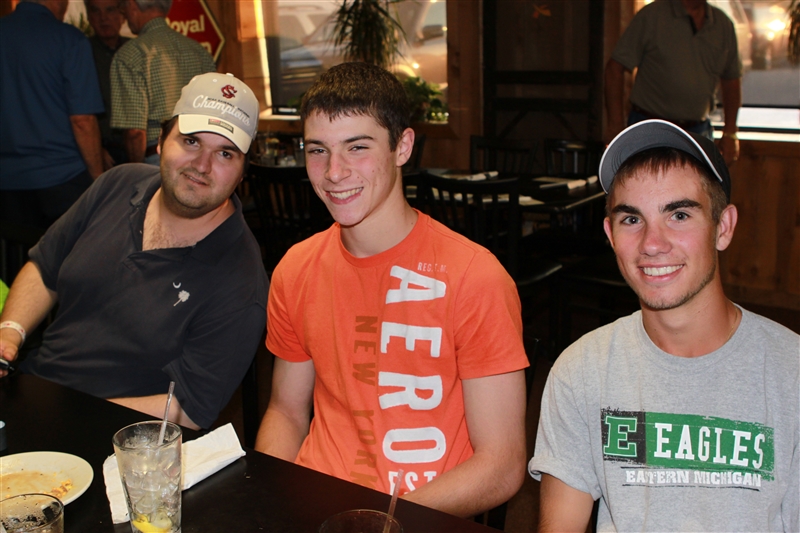 When our doctors first started talking about visiting a Neuropsych, they were having conversations with each other, while we were in the room. “Do you think a neuropsych would help?” “Yes, but not yet”… or “Has he been to neuropsych yet? That could help with the IEP (Individualized Education Program) once he’s in school.” I figured that they would eventually start talking to me if they felt we had reached whatever qualifying milestone they needed.
When our doctors first started talking about visiting a Neuropsych, they were having conversations with each other, while we were in the room. “Do you think a neuropsych would help?” “Yes, but not yet”… or “Has he been to neuropsych yet? That could help with the IEP (Individualized Education Program) once he’s in school.” I figured that they would eventually start talking to me if they felt we had reached whatever qualifying milestone they needed.
Then at some point, a shift happened. His teacher in 4K sat me down and prepared me for not moving him on to kindergarten. I stood my ground, it’s kindergarten, not rocket science. The first parent-teacher conference in kindergarten his (different) teacher already was talking about not promoting him to first grade. She emphasized that first grade is a lot more challenging than kindergarten and he wouldn’t be able to keep up.
So, here we are, in the office of someone called a Neuropsychologist, not really knowing what to expect but confident that Henry doesn’t have the “global delay” his teachers are so quick to add to his records. First impression… she’s a woman, and she’s pregnant. Already I’m more at ease and start speaking to her mother to mother. She tells me that she has all of Henry’s medical records and considers herself an expert on his case. Today she is interested in learning how his personality has shaped his medical history. I immediately start quizzing her on things (I really just can’t help it, I’m a little sensitive about anyone other than me claiming to be an expert on my kid!). After she’s proved herself to my satisfaction, we start talking.
Neuropsychologists study the science of learning. The purpose of the evaluation is to gather data from Henry that will inform us as to how he learns, and to let that information shape our IEPs as we move forward. There are two “camps” for lack of a better word in the world of neuropsychology. The first: get the kid evaluated as early as reasonable and use that information to take advantage of the (still available) plasticity in the brain to address shortcomings. The child has to be old enough to provide reliable data (understand the questions being asked and answer them to the best of their ability), and the child has to be cooperative enough to give them enough data to make it worth their while. The second camp: wait until after age 8 or so, when the brain may have lost some plasticity, and evaluate the child for the purpose of giving them tools to adapt to their individual challenges and navigate the world. The benefits to getting evaluated early: you can possibly get information that can help shape the still pliable neural pathways and actually change the way the brain processes information. The benefits to getting evaluated later: you can get more data, and more reliable data from a 9 year old than you can from a five year old and that additional information could provide really valuable insights. Both of these camps have the age of 8 as the time in a child’s life when the brain loses much of its plasticity. That being said, my understanding is that once puberty hits, we’re all back in the same boat and it’s anyone’s guess as to what’s going on in there.
So. While I’m meeting with the Neuropsych, Henry is taken away with a teacher who is performing a variety of tests. Each hour, he gets a 10 minute break where he visits with me in the waiting room, I ply him with hot chocolate from the vending machine and prep him for another round.
He lasts five hours before they don’t consider the data he’s providing reliable anymore and we get released. (aka, he’s too tired to cooperate)
Here’s where I feel like a deflated balloon. I had so much anxiety built up over the process, the unknown, and now the ball was in someone else’s court. The stakes were so high, and I didn’t have any control over the outcome. On the other hand, everyone was confident they had a good quantity of reliable data, and would be able to make an appropriate recommendation, that I really just had to let them do their jobs. How was THIS the hardest part? It wasn’t up to me anymore, it was completely out of my hands. And I was lost.
Timelapse…
A month has gone by since I wrote that first part. A month. It wasn’t supposed to be that long, but the results came, and then a whirlwind of conversations with his “team” at school, and I am definitely no longer lost. Let’s start with our results. A four-page single- spaced document presenting the data gathered during his testing. And there is lots of data. They identified all of the tests they performed, from the Beery Developmental Test of Visual-Motor Integration, 5th Edition, (VMI-5) to the Wechsler Individual Achievement Test, Third Edition (WIATT-III), and everything in between. A total of 14 different tests, all laid out in alphabetical order with numerical scores that determine which percentile he’s at compared to other five year olds. So much data. Then at the end of the data came her assessments. She recommended he be promoted with his class to first grade. She recommended we continue to see a child psychologist to deal with anxiety and aggression, and she absolutely insisted we start seeing a Speech pathologist to help bridge the gap between the (high average) receptive skills and (impaired) expressive skills. She assessed him, based on the data, and made really specific recommendations for Henry.
And this is where the fun part starts. I forwarded the report to the school and everyone sprung into action. Immediately. For me, the data was a bunch of technical jargon and I followed along but I really embraced the recommendations, and the data… well that was just what got us to the recommendations. The data though, for the professionals, really impacted them in a way I didn’t anticipate. His PT, OT, SLP, Special Ed teacher and even his kindergarten teacher were all familiar with the tests to some degree and were able to take these numbers, this data, and change the way they were treating my son. The test results motivated them in a way that no amount of mom advocacy could. It was remarkable. And it happened fast.
Now I’m pumping the brakes as they’ve changed the way he’s being evaluated in the classroom, incorporating matching and visual cues in lieu of just auditory and expressive testing. He’s come ‘so far’ in the past month that now they are retesting him to see if he even still qualifies for additional developmental supports or if it’s just the physical modifications like mounted scissors and dycem on his desk to hold down the paper. I’m the one hoping in one breath that he doesn’t do as well for the next series of tests so that he still gets additional classroom supports, while in the next breath eager to move forward with our new smarty-pants.
I had no idea what to expect from the entire Neuropsych experience. I’ve been told repeatedly that Henry doesn’t qualify for Speech, and that he’s just quiet, but when he speaks he does it at an age appropriate level. The data from the testing demonstrated, clearly, that Henry does need Speech, but not for the articulation that most of the school SLP’s focus on. He needs a really great SLP with a specific skill set. One who can help us bridge the gap between his low expressive and high receptive skills. And because we have the Neuropsych report, we can get a referral to the right SLP and actually try to shape the neural pathways in his brain during this window of plasticity still available.
Because we have the Neuropsych report, we can say with certainty that our son is a visual-spatial learner and incorporate proven strategies for how to help VSL students succeed into his IEP. I had no idea what to expect from Neuropsych. And honestly the hardest part was having so little control over any of it. I micro-manage so much of Henry’s world, that letting go of that was the most difficult part. Now, I’m back to micro-managing and advocating, but with a four-page single-spaced report in my hand to give my voice weight. For us, for your family. This couldn’t have been a better experience.
View Sample IEPs or Contribute and IEP to the CHASA IEP Bank
Article written by Beth, mom of two, Charlotte (8) and Henry (4) in a small town in rural America. Henry had a stroke in utero and as a result has Cerebral Palsy and Right sided hemiplegia. Beth still regularly Googles how to correctly spell Cerebral Palsy. She would describe her parenting style as somewhere in between desperately hopeful and cautiously optimistic, and is tremendously excited to blog about her parenting adventure on CHASA.







